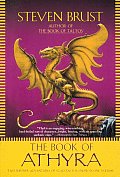
| Series: | Vlad Taltos #6 |
| Publisher: | Ace |
| Copyright: | 1993 |
| Printing: | February 2003 |
| ISBN: | 0-441-01010-5 |
| Format: | Trade paperback |
| Pages: | 208 |
Athyra is the sixth Vlad Taltos book and directly follows the events of Phoenix. It could be read on its own, but you'd miss much of the point. I read it as part of the The Book of Athyra omnibus, which is what the sidebar information is for.
This is the first Vlad Taltos book that's not first-person narration by Vlad. Brust shifts styles dramatically here to a fairly tight third person from the perspective of a boy named Savn, a Teckla (Dragaeran peasant class) in a farming community far from the capital. He helps his family in the fields during harvest and apprentices with the local physicker (a small-town doctor, essentially). Vlad is the first Easterner he's ever met and just a curiosity, until his arrival in town is followed shortly by the mysterious death of a local and he becomes rather more involved in Vlad's life than he expected.
There is a bit of a mystery plot to Athyra, punctuated by action that ties back to Taltos, but it's mostly a drama of personalities mixed with a bit of a coming of age for Savn. The best part about the book is the chance to see Vlad from the outside through someone else's eyes. A long-time reader of the series can fill in some of Vlad's internal monologue from the expressions that Savn sees, but Vlad is cryptic, self-contained, and a hard puzzle for Savn. Athyra also does a good job showing the consequences and impact of some of the less morally defensible things Vlad does in his own protection.
Unfortunately, the interesting external perspective comes at the cost of pacing and entertaining narration. Savn is an okay fellow, but he's nowhere near as interesting as Vlad, he doesn't think as fast, and he doesn't act as quickly. The narration is stock third-person, which lacks the spark of Vlad's first-person sarcasm and constant momentum. As a result, this is the first book of this series that I could describe as slow. At times, this provides opportunity for introspection and mulling over of moral dilemmas, which after Phoenix and Teckla is needed. But often I wanted things to happen at a slightly faster pace. The conclusion is an improvement, featuring one of those complex, thought-out fight scenes that Brust is so good at writing and a lot of stress for poor Savn, but it takes quite a while to get there.
Athyra feels like an interlude in the larger series. There's almost no elaboration of the world background and no sign of Vlad's set of friends. There is some setup for the next book and some important introspection for Vlad, but the basic problems established at the end of Phoenix remain unresolved. We see Vlad from a new angle and find out some interesting bits about his jheregs, but otherwise Athyra is rather forgettable. It's worth reading if you're reading the whole series anyway, but it's not the book that will win over a new fan.
Followed by Orca.
Reviewed: 2008-09-07